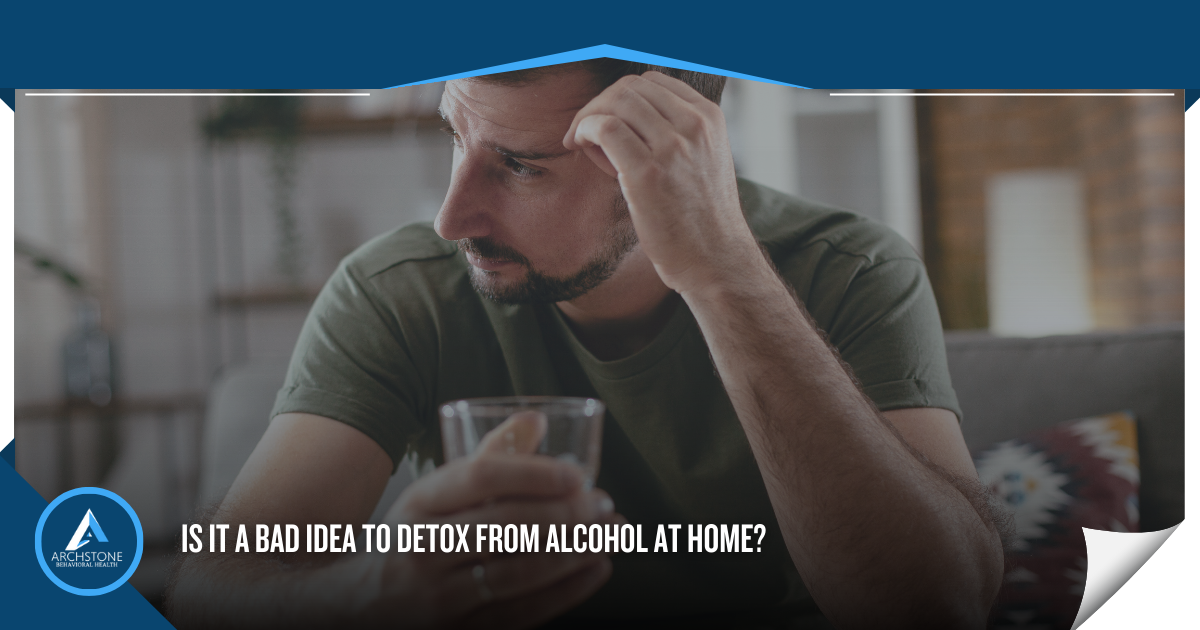Is it a Bad Idea to Detox From Alcohol at Home?
Get Help Now
Alcohol addiction can impact every aspect of your life. Your physical health, emotional well-being, relationships, and more can suffer when alcohol becomes the center of your life.
No one chooses to live with alcohol addiction. Heavy drinking can change how your body and brain work. These changes can make it very hard to quit drinking when you choose.
People with alcohol addiction often need professional treatment and support to get sober and avoid relapse. In most cases, alcohol abuse treatment programs begin with a medical detox program.
During detox, people receive medications, emotional support, and supervision that help them stay safe and comfortable during detox. These treatments allow people to detox from alcohol safely.
Some people may wonder if it’s possible to detox from alcohol at home. They may believe that an at-home alcohol detox is possible, safe, and cost-effective.
This article will explore the risk of detoxing at home. You will learn about what happens during alcohol withdrawal and why it’s essential to avoid a home detox.
Reach out to the Archstone Behavioral Health team now to learn about our alcohol use disorder rehab programs. You may also ask questions, verify your insurance, or set up an intake assessment.
What Happens During Alcohol Withdrawal?
Alcohol reduces activity in the central nervous system (CNS). Slower CNS activity causes alcohol’s side effects, which include:
- Drowsiness
- Relaxation
- Slurred speech
- Loss of coordination or balance
- Impaired judgment
- Mood changes
Your body makes up for alcohol’s effects by increasing CNS activity.
If you drink heavily for a long time, your body can adjust to the presence of alcohol. You may need to drink more to feel “buzzed.” You may also be able to drink a lot without appearing or feeling drunk.
If you struggle with alcohol abuse and stop drinking, you are likely to experience withdrawal symptoms. These symptoms occur because your CNS keeps working at an increased rate.
Symptoms of alcohol withdrawal include:
- Tremors (shaking)
- Excessive sweating
- Mood swings
- Nausea
- Vomiting
- Elevated heart rate
- Insomnia
- Cravings for alcohol
Some people develop more severe symptoms during withdrawal, including dehydration and seizures.
What are the Risks of At-Home Detox?
Detoxing from alcohol can be very challenging. Alcohol withdrawal symptoms can make people so uncomfortable that they cannot get through the process on their own.
Here are some of the risks if you choose to detox from alcohol at home.
Dehydration
As your body withdraws from alcohol, you might feel nauseated. You may be unable to eat or drink, and staying hydrated can be challenging. Vomiting and excessive sweating can lead to dangerous dehydration.
Seizures
While not everyone undergoing alcohol detox will experience seizures, the risk is higher for those with a history of severe alcohol dependence or previous withdrawal seizures. Seizures can occur unpredictably and without warning. Seizures can be dangerous if they happen in settings where medical assistance is not readily available. More than 5% of individuals with untreated alcohol withdrawal experience seizures.
Delirium Tremens (DTs)
In rare cases, some people develop a condition called Delirium Tremens during alcohol withdrawal. Symptoms of DTs include:
- Delusions
- Elevated body temperature
- Extreme confusion
- Elevated heart rate
- Shaking
- Seizures
- Hallucinations
While only 3-5% of people in acute alcohol withdrawal experience Delirium Tremens, it is a life-threatening condition. People who develop it require immediate medical treatment to avoid long-term harm or death. Without treatment, DTs can have a mortality rate of up to 35%
Relapse
Relapsing before detox is complete can be very dangerous. After a short period of sobriety, people lose some of their alcohol tolerance. If they drink again, they face a greater risk of alcohol overdose.
The safest way to detox is to have treatment from mental health and medical professionals. If you live with alcohol use disorder, seek treatment from a medically-supported detox program.
What Happens in a Detox Program?
At Archstone Behavioral Health, we offer holistic, medically-supported detox programs for alcohol addiction. These programs help people safely stop drinking and learn to avoid relapse.
Here is what to expect in an alcohol detox program.
Assessment
Before beginning your detox, your treatment team will assess your needs. This assessment will include:
- Questions about your drinking and other substance use
- A mental health and medical history
- Family history of alcohol addiction
- Lab testing
- Physical exam
This information will help your team identify any issues that may complicate detox. They will also use this information to tailor a treatment plan to meet your unique needs.
Detox
During detox, your support team will monitor your withdrawal symptoms. Medical and mental health staff will provide treatments to keep you safe and comfortable during detox.
Your treatment plan may include:
- Medications to reduce withdrawal symptoms, including cravings
- Emotional support, including individual counseling and support groups
- Education and coordination with family members (when appropriate)
- Round-the clock supervision
- 24/7 access to mental health and medical care
- Holistic therapies, including nutrition support, massage, yoga, and more
Your treatment team may use benzodiazepines to treat your withdrawal symptoms. They may taper these medications as you progress.
Find an Alcohol Detox Program
Don’t take the risk of detoxing from alcohol at home. Get the treatment and support you deserve at Archstone Behavioral Health.
Our team of specialists designs effective treatment programs for each person. Contact us now to learn more about our comprehensive detox programs. You can also verify your insurance, ask questions, or set up an intake evaluation.
